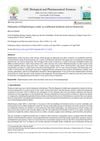 15 citations,
December 2013
15 citations,
December 2013 Men with more vanadium in their blood and who drink less soy milk are more likely to have hair loss.
42 citations,
June 2019 in “Aging” 3,4,5-tri-O-caffeoylquinic acid promotes hair growth by activating the β-catenin pathway.
 17 citations,
February 2013 in “PLOS ONE”
17 citations,
February 2013 in “PLOS ONE” 6-Gingerol, found in ginger, may slow down hair growth and could be used for hair removal.
 2 citations,
March 2021 in “Carpathian Journal of Food Science and Technology”
2 citations,
March 2021 in “Carpathian Journal of Food Science and Technology” Caraway, Chinese chives, and cassia may improve health and prevent diseases due to their nutrients and medicinal properties.
 24 citations,
January 2014 in “The American Journal of Chinese Medicine”
24 citations,
January 2014 in “The American Journal of Chinese Medicine” The leaves of Platycladus orientalis have potential health benefits but require more research for safety and understanding how they work.
 95 citations,
February 2018 in “Dermatology and Therapy”
95 citations,
February 2018 in “Dermatology and Therapy” Nutraceuticals may improve skin health and protect against aging, but more research is needed on their optimal use and possible health risks.
 4 citations,
March 2018 in “Daehan han'yi hag'hoeji/Journal of Korean medicine”
4 citations,
March 2018 in “Daehan han'yi hag'hoeji/Journal of Korean medicine” Astragalus membranaceus helps regrow hair and reduce hair loss symptoms.
9 citations,
May 2021 in “Frontiers in aging neuroscience” Taking triterpenoids from Ganoderma lucidum over a long time can help slow down brain aging and improve overall health in mice.
 34 citations,
October 2011 in “Pathology Research International”
34 citations,
October 2011 in “Pathology Research International” Behçet's Disease may be caused by genetic and environmental factors leading to abnormal immune responses, and stress management and new treatments could improve patient outcomes.
 3 citations,
May 2021 in “Dermatologic Clinics”
3 citations,
May 2021 in “Dermatologic Clinics” The document concludes that more research is needed to understand hair loss in men and to find new treatments.
 4 citations,
January 2018 in “Cosmetics”
4 citations,
January 2018 in “Cosmetics” Spin traps like PBN could protect skin from pollution and sunlight in cosmetics but need more research for safe use.
26 citations,
January 2018 in “Skin appendage disorders” Thallium, mercury, selenium, and colchicine strongly cause hair loss.
 17 citations,
April 2021 in “Clinical Phytoscience”
17 citations,
April 2021 in “Clinical Phytoscience” Chitrak is a medicinal plant with health benefits like fighting microbes, reducing inflammation, and promoting hair growth, but it can be toxic and needs more research.
 9 citations,
August 2017 in “Photochemistry and Photobiology”
9 citations,
August 2017 in “Photochemistry and Photobiology” Red light at 627 nm can safely trigger IL-4 release in skin cells, potentially helping treat inflammatory skin conditions.
 75 citations,
May 2013 in “Journal of the American Academy of Dermatology”
75 citations,
May 2013 in “Journal of the American Academy of Dermatology” Zinc deficiency in children can cause skin issues and can be serious if not diagnosed and treated properly.
 3 citations,
October 2022 in “Frontiers in Surgery”
3 citations,
October 2022 in “Frontiers in Surgery” Proteomics combined with other technologies can lead to a better understanding of skin diseases.
 May 2024 in “BMC veterinary research”
May 2024 in “BMC veterinary research” Metabolites and diet affect hair growth cycles in cashmere goats.
 3 citations,
April 2021 in “GSC Biological and Pharmaceutical Sciences”
3 citations,
April 2021 in “GSC Biological and Pharmaceutical Sciences” Elephantopus scaber has many health benefits, including antibacterial, antifungal, anticancer, and antioxidant properties.
 December 2024 in “Journal of Population Therapeutics and Clinical Pharmacology”
December 2024 in “Journal of Population Therapeutics and Clinical Pharmacology” Rosemary and kalonji seeds can improve hair health and treat hair conditions.
466 citations,
June 2009 in “Experimental dermatology” We now understand more about what causes acne and this could lead to better, more personalized treatments.
 153 citations,
March 2017 in “Endocrine”
153 citations,
March 2017 in “Endocrine” Male pattern baldness involves genetics, hormones, and needs better treatments.
 8 citations,
May 2017 in “Current traditional medicine”
8 citations,
May 2017 in “Current traditional medicine” Stinging nettle has compounds that help with joint pain, arthritis, and prostate issues.
 32 citations,
December 2013 in “Biological & Pharmaceutical Bulletin”
32 citations,
December 2013 in “Biological & Pharmaceutical Bulletin” Rice bran extract can potentially treat hair loss by promoting hair growth and increasing the number of hair follicles.
 22 citations,
November 2013 in “Clinical and experimental dermatology (Print)”
22 citations,
November 2013 in “Clinical and experimental dermatology (Print)” Ecklonia cava, a type of seaweed, may help hair grow.
 2 citations,
December 2017 in “Bangladesh Journal of Pharmacology”
2 citations,
December 2017 in “Bangladesh Journal of Pharmacology” Black seed oil significantly protects against hair loss from chemotherapy.
 2 citations,
August 2023 in “Marine drugs”
2 citations,
August 2023 in “Marine drugs” Collagen from tilapia scales may improve hair and skin health by reducing stress and inflammation and encouraging hair growth.
 49 citations,
July 2021 in “Nutrients”
49 citations,
July 2021 in “Nutrients” Eating healthy, exercising, and taking certain supplements can help manage Polycystic Ovary Syndrome symptoms.
 3 citations,
January 2021 in “Applied sciences”
3 citations,
January 2021 in “Applied sciences” Fermented red ginseng and a traditional herb mix improved hair growth in mice.
 1 citations,
May 2017 in “InTech eBooks”
1 citations,
May 2017 in “InTech eBooks” Some natural remedies may help with hair regrowth, but more research is needed to confirm their effectiveness and safety.
 67 citations,
February 2020 in “Journal of Ginseng Research”
67 citations,
February 2020 in “Journal of Ginseng Research” Korean Red Ginseng has beneficial components that help with stress, immunity, fatigue, memory, blood flow, and disease protection.


























